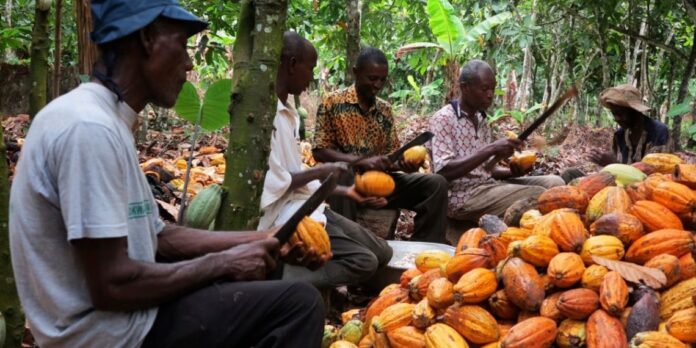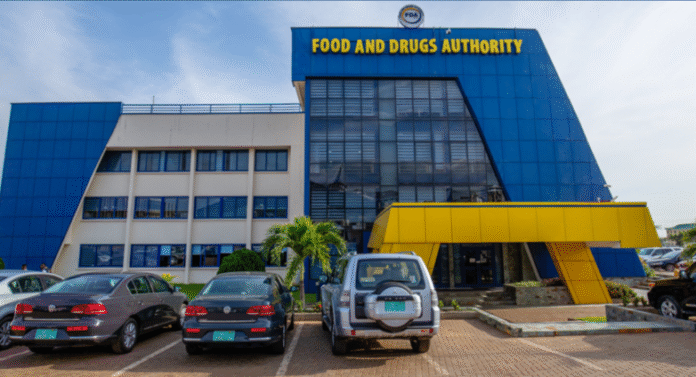Today, the Chamber of Agribusiness Ghana (CAG) has released a comprehensive technical analysis revealing the 20% excise duty on natural fruit juices causing catastrophic damage to Ghana’s fruit processing industry, destroying up to 127,000 jobs across the agricultural value chain, and eliminating a potential USD 1 billion annual export opportunity.
The policy, intended as a public health measure, is instead penalizing nutritious products while protecting cheaper artificial beverages, contradicting both health objectives and Ghana’s economic development aspirations.
The excise duty, colloquially termed the “Ofori-Atta Killer Tax” by industry stakeholders, has forced juice processing factories to operate at just 30-45% capacity instead of the optimal 70-85%, creating a cascade of negative impacts on local farmers who depend on processors as reliable off-takers for their pineapples, oranges, coconuts, mangoes, and other fruits.
CATASTROPHIC IMPACT ON FARMERS AND RURAL LIVELIHOODS
“The 20% excise duty is not just a tax on juice processors; it is a direct attack on the livelihoods of 50,000 to 120,000 farming households across Ghana,” said Anthony Morrison, Chief Executive Officer of the Chamber of Agribusiness Ghana. “When processing factories reduce production due to suppressed demand, farmers face 15-30% price declines, watch 30-40% of their harvest rot in the fields, and lose the reliable markets that contract farming provides. Women farmers, who comprise 55-60% of fruit producers, are disproportionately affected.”
The analysis documents how juice processors serve as critical anchor buyers providing farmers with predictable pricing through contract agreements, quality flexibility that accepts cosmetically imperfect fruits unsuitable for fresh markets, aggregation services that reduce transport costs, and technical extension services that improve yields. When these markets disappear, rural communities in the Eastern, Volta, and Central Regions face increased poverty, youth migration to urban centers, and economic decline.
POLICY CONTRADICTS INTERNATIONAL BEST PRACTICES
The Chamber’s analysis examined beverage taxation policies in over 100 countries that have implemented sugar-sweetened beverage (SSB) taxes. International best practice consistently distinguishes between artificially sweetened beverages and 100% natural fruit juices based on nutritional content, absence of added sugars, agricultural development benefits, and value addition to domestic agriculture.
“Countries like the Philippines, South Africa, and Barbados explicitly exempt 100% natural fruit juices from their SSB taxes,” Morrison noted. “Even Barbados, a small island economy with limited agricultural capacity, exempts natural juices to protect regional agricultural trade. Ghana, with its vast fruit production potential, is doing the exact opposite—we are taxing our own agricultural value chain while protecting imported concentrates and artificial beverages.”
The Philippines’ TRAIN Law (2018) applies a two-tier tax on beverages with added sweeteners while explicitly exempting 100% natural fruit and vegetable juices. South Africa’s Health Promotion Levy (2018) exempts 100% fruit juice and bottled water while taxing carbonated SSBs. These policies have successfully reduced unhealthy beverage consumption while protecting agricultural processing sectors.
USD 1 BILLION EXPORT OPPORTUNITY DESTROYED
Global demand for natural and functional beverages is growing at 6-8% annually, particularly in Africa, the Middle East, Europe, and North America. Ghana is uniquely positioned to capture this market with potential annual exports valued at USD 700 million to USD 1 billion across product categories including:
- Pineapple juice and not-from-concentrate products: USD 250-300 million
- Citrus juice and concentrates: USD 200-250 million
- Coconut water and blends: USD 150-200 million
- Functional and fiber juices: USD 100-150 million
However, the 20% excise duty undermines export competitiveness by raising production costs that must be absorbed for price-competitive exports, discouraging long-term capital investments, signaling policy unpredictability to international buyers, and preventing Ghanaian processors from building brand reputation in premium markets.
IMPORT SUBSTITUTION OPPORTUNITY LOST
Ghana currently spends USD 350-450 million annually importing beverage concentrates, powdered drinks, and artificial sweetened beverages that could be produced locally. With supportive tax policies, the domestic natural juice industry could realistically achieve 30-40% import substitution within 3-5 years, retaining USD 120-180 million in foreign exchange annually.
“The excise duty creates a perverse situation where imported concentrates and artificial beverages face lower effective taxation than locally produced natural juices made from Ghanaian fruits,” Morrison explained. “This policy is actively undermining import substitution efforts and increasing unnecessary pressure on the cedi—directly contradicting our macroeconomic stabilization objectives.”
PUBLIC HEALTH PARADOX
While the excise duty was promoted as a public health intervention to reduce sugar consumption, the policy is producing the opposite effect. Higher prices for nutritious 100% natural fruit juices—which contain vitamins, dietary fiber, and antioxidants—are pushing consumers toward cheaper artificial beverages and powdered drinks with lower nutritional value.
“This is a public health paradox,” Morrison stated. “We are making healthy, nutritious products more expensive while inadvertently protecting unhealthy alternatives. Over time, this will contribute to rising rates of diabetes, hypertension, obesity, and micronutrient deficiencies. The long-term public health costs from these conditions will far exceed any short-term excise revenues collected.”
CONFLICT WITH 24-HOUR ECONOMY INITIATIVE
The Chamber’s analysis highlights a direct policy conflict between the excise duty and Ghana’s 24-Hour Economy initiative. Natural juice processing is inherently suited to multi-shift operations—continuous operations are standard practice globally, multiple shifts enable rapid processing of perishable fruits, higher throughput reduces per-unit costs, and night shifts create premium wage opportunities for workers.
However, the excise duty has suppressed demand to the point where factories cannot justify operating beyond single shifts. Current capacity utilization of 30-45% barely sustains daytime operations, directly contradicting the 24-Hour Economy vision of maximizing productive capacity through around-the-clock manufacturing.
CHAMBER’S POLICY RECOMMENDATIONS
The Chamber of Agribusiness Ghana is calling for immediate government action across three priority areas:
Immediate Actions (0-6 months):
- Zero-rate or exempt 100% natural fruit juices from excise duty, including not-from-concentrate products, freshly pressed juices, and fiber-rich blends made from Ghanaian fruits without added sugars, sweeteners, or preservatives
- Maintain or increase excise rates (25-30%) on genuinely unhealthy beverages with added sugars, high-fructose corn syrup, artificial sweeteners, and less than 25% fruit content
- Establish a multi-stakeholder policy review committee comprising Ministry of Finance, Ministry of Food and Agriculture, Ghana Revenue Authority, juice processors, farmer associations, and public health experts to conduct quarterly reviews of policy impacts
Medium-Term Strategic Interventions (6-24 months):
- Develop a comprehensive agro-processing investment incentive package including 5-year tax holidays for new processors, import duty waivers on specialized equipment, and working capital support through Ghana Exim Bank at 10-12% interest rates
- Launch export market development support through GEPA including market intelligence, international certification assistance, and matching grants for export marketing
- Strengthen farmer-processor linkages through contract farming arrangements, extension services, aggregation center investments, and youth/women empowerment programs
Long-Term Vision (2-5 years):
- Scale Ghana’s export-oriented processing capacity from 2-3 facilities to 6-8 facilities capable of achieving USD 700 million to USD 1 billion in annual exports
- Position Ghana as West Africa’s premium fruit processing hub under the African Continental Free Trade Area (AfCFTA)
- Integrate natural juice processing as a flagship sector in the 24-Hour Economy initiative with fasttrack approvals, energy tariff incentives, and labor regulation flexibility
FISCAL IMPACT: NET GAIN FOR GOVERNMENT REVENUES
The Chamber’s analysis demonstrates that removing the excise duty on natural juices is not a revenue loss but a strategic investment with substantial fiscal returns. While zero-rating eliminates direct excise revenue estimated at GHS 80-120 million annually, the fiscal gains from increased economic activity significantly exceed this amount:
- PAYE taxes from 60,000-120,000 additional jobs: GHS 200-400 million
- Corporate taxes from expanded processor operations: GHS 100-180 million
- Reduced NHIS costs from improved nutrition: GHS 50-100 million
- Total net fiscal gain: GHS 270-560 million annually
“This is not about choosing between revenue and development,” Morrison emphasized. “The evidence clearly shows that removing this misguided tax will generate significantly more government revenue through employment taxes and corporate income taxes, while simultaneously protecting farmer livelihoods, creating jobs, and positioning Ghana for export success.”
CALL TO ACTION
The Chamber of Agribusiness Ghana is calling on the government, Parliament, and all stakeholders to recognize the urgent need for policy correction. The 20% excise duty on natural fruit juices is not merely a tax; it is a structural impediment to Ghana’s agricultural transformation that penalizes value addition, destroys rural livelihoods, and forecloses a billion-dollar export opportunity.
“The choice facing policymakers is straightforward: tax away a future industry, or unlock it for shared prosperity,” Morrison concluded. “We urge the government to align Ghana’s beverage taxation policy with international best practices immediately. Our farmers cannot wait. Our rural communities cannot wait. Ghana’s economic future cannot wait.”
The Chamber stands ready to work collaboratively with government, development partners, and all stakeholders to implement these reforms and unlock Ghana’s full potential as West Africa’s premier fruit processing hub under AfCFTA.












